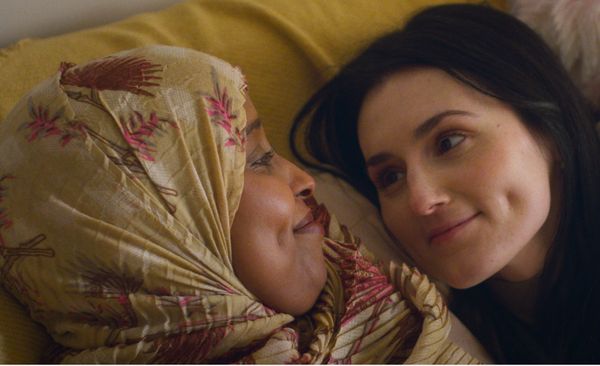Eye For Film >> Movies >> Lollipop (2024) Film Review
Lollipop
Reviewed by: Amber Wilkinson

Mother and child relationships may sometimes be fraught in Daisy-May Hudson’s Lollipop, but one thing they don’t lack is love. And one thing you won’t want to have a lack of when you watch it is a packet of tissues as this is a story that is oiled by tears of various sorts. Her character study shows Molly (Posy Sterling) brushing up against the sharp edges of the English care system although Hudson’s main focus is on the emotional territory that Molly is struggling to cross.
The single mum has just been released from a four-month jail stint for reasons that are never specified. Her 11-year-old daughter Ava (Tegan-Mia Stanley Rhoads) and son Leo (Luke Howitt), five, were theoretically being cared for by her mum Sylvie (TerriAnn Cousins) while Molly did her time but in her absence they have been taken into foster care.
When Molly goes to social services only to be told she can’t simply pick them up, it’s as though all the air has suddenly been sucked out of her world. It’s also the moment when Sterling announces herself as a name to look out for and the start of an emotionally volatile performance that she fuels with the nervous energy and borderline chaos of a woman who is constantly trying to keep a lid on her emotions.
The sudden appearance of Amina (Idil Ahmed), a childhood friend she’s not seen in years - one of a couple of noticeable but necessary contrivances employed by Hudson to steer the plot - leads Molly to clamp down on her panic for appearances sake. Amina, it turns out, has plenty of trouble of her own as she and her young daughter Mya (Aliyah Abdi) are currently living in a hostel after a previous landlord refused to return her deposit.
It’s clear, via phone calls, that Ava and Leo love their mum dearly but also that Molly is desperate. Being jailed, she is told, means that she made herself “intentionally homeless” and, with the kids in care, she only qualifies for a single person’s dwelling in any event. Hudson doesn’t labour the point, nor paint social security staff as ogres, but the Catch 22 nature of this is obvious.
Molly is vulnerable, not just in the tent where she clutches keys in her knuckles wary of who might be outside, but when she visits Sylvie, whose nickname for her is “Lollipop” and who becomes increasingly volatile with drink. The contrast between the two women’s approach to motherhood is brought home in two scenes involving singing. In one, Molly is hectored through a rendition of Amazing Grace by Sylvie, while in the second, Molly and her kids blast through a version of I Only Want To Be With You that must be a culmination of repeated practice between them.
Hudson knows about the experiences of living in a homeless hostel first-hand, having documented her own family’s stay in one for her feature-length documentary Half Way. Although the emotions in this story are raw, she approaches them with sensitivity and a strong respect for people who are trying hard even if they don’t always succeed.
Reviewed on: 21 Aug 2024















